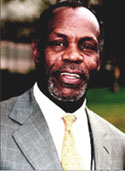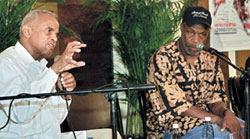
WASHINGTON (FinalCall.com)–He was the tallest tree in our forest: An enormously popular Black actor who stood firm in behalf of justice for those who are denied justice in a cruel world.
Powerful, arch-conservative White forces attacked him, not on equal ideological terms, but by exerting their influence to stifle his very ability to earn a living.
The story of the unjust persecution and interference into the career of legendary actor, diplomat and humanitarian Paul Robeson half a century ago is well known.
And while actor, diplomat, humanitarian Danny Glover resists vain comparisons with Robeson the icon, who is his own personal idol, he finds himself, nevertheless, under attack by the same forces, in the same manner, which “blacklisted” Mr. Robeson and hundreds of other entertainment figures in the 1950s because of their dissent with wrong-headed, but otherwise popular U.S. policies.
This year, after an intense four-day mobilization to support the chair of its Board of Directors, TransAfrica announced victory May 21 in upholding Danny Glover’s right to free speech. TransAfrica’s “Dial-in for Democracy” campaign produced a flood of calls, e-mails and letters to telecommunications giant MCI in response to an attack by conservative extremists who called for a boycott of MCI products unless Mr. Glover’s contract to appear in an advertising campaign was canceled immediately.

The company quickly announced that it would honor its contract with Mr. Glover through January 2004.
Mr. Glover and TransAfrica President Bill Fletcher are cautious in victory, however, warning that their opponents are relentless, and will try again to try to wear them down.
“This is a short-lived victory. We still have to be very vigilant in terms of responding to these kinds of attacks,” Mr. Glover told The Final Call in an interview.
“I’ve said from the onset, this is not so much an attack against me personally, but an attack on all of us. We have to make that very clear.
“In the workplace, people are being harassed. And other places, people are being harassed” for simply expressing their beliefs.
The form of vigilance, he continued, is to follow Mr. Robeson’s example. “There must be, there has to be at this time, a little bit of Paul in all of us.
“The fact (is) that Mary McLeod Bethune said of Paul that ‘he’s the tallest tree in our forest,’ and in cutting down Paul, they went after the most creative, the most outspoken person, with incredible intellect, and with incredible passion, they went after him.
“I want to believe that a bit of Paul resides in me. But I think there has to be–and there is–a little Paul in all of us.
“When Paul was attacked, there wasn’t the kind of technology that we have now. Bill Fletcher, the President of TransAfrica, just got on the phone and got on the Internet, and all of a sudden we had a response for Dial-in for Democracy, which was very, very important in terms of mobilizing people and getting people out, and getting people to call MCI, creating a major response, almost immediately. But that kind of technology did not exist” at the time Mr. Robeson was persecuted, he continued.
Radio interviews and other media appearances, especially in New York where he is busy with daily matinee and evening performances on Broadway’s Royale Theater of South African author Athol Fugard’s “Master Harold and the Boys,” helped turn the public tide in Mr. Glover’s favor in this campaign.
His goal remains, to build on the foundation and sacrifice of Mr. Robeson, “because more than anything else, whatever Paul gave to us at that time, we need to not only claim it, but also expand it and bring it to life in as many people as we can.”
Just as were the attacks on Mr. Robeson, this attack on Mr. Glover comes at the height of his popularity. Mr. Glover won an NAACP Image Award, as well as a cable ACE Award for his performance in HBO’s production of “Mandela.” He received Emmy nominations for Best Supporting Actor for his roles in the television mini-series “Lonesome Dove,” and for Turner Network Television’s “Freedom Song.”
His film credits are numerous and memorable, including “The Color Purple,” “Places in the Heart,” “Witness,” “Silverado,” and, of course, the “Lethal Weapon” series, “Angels in the Outfield,” “Boesman and Lena,” and “The Royal Tannenbaums.”
The attacks, however, have nothing to do with the integrity of Mr. Glover’s stage or film career, or the artistic merit of his work. The attacks have everything to do with the generous portfolio of human rights causes he supports.
He is a frequent visitor to the African continent. He is now serving an extended term as Goodwill Ambassador for the United Nations Development Program. In that capacity he also works to raise awareness about the impact of the AIDS crisis in Africa, as well as in under-served communities in the United States.
Mr. Glover was attacked last year for expressing his opposition to the death penalty, even if the accused Washington Beltway Sniper suspects were convicted. A Brazilian magazine recently quoted him criticizing Pres. George W. Bush for pushing a “conservative program designed to eliminate everything Americans had accomplished” in the areas of race and equality.
But it was his signature–along with those of more than 150 other artists, including actor Harry Belafonte–on a letter supporting Cuban President Fidel Castro in the May 1 edition of Cuba’s state-run newspaper Granma, which provoked conservative groups like Judicial Watch to call for the MCI boycott.
“Well, as you know, these attacks are relentless,” Mr. Glover told The Final Call. “The dossier that’s been kept on me, I’m sure, began long before my comments about the death penalty.
“They perhaps began when I was involved in issues around the end of apartheid. They were begun when we talked about issues around the poor, issues around AIDS. All those things are places where they fester.
“The attacks are not because you say something outrageous, because I never said anything outrageous. These attacks were because I said things about what’s just.
“That is the tragedy of this. When we talk about issues around health care, when you talk about issues around education, when you talk about issues around the prison industrial complex, all those particular issues, which are sensible issues, issues which deal with the basic livelihood and basic right of human beings, that’s where the attack comes from.”
Mr. Glover is confident that he can personally weather the storm of future attacks against his career. “I have a very modest lifestyle. I don’t have an entourage. I probably wouldn’t be able to give as much money to the organizations I give money to, but I’d still give.
“The fact is that–and I’ll say it quite frankly–that what is happening to me is extraordinary in this business. It doesn’t happen to many actors and particularly Black actors, actors of color. It’s (career success) provided me an opportunity to take care of my dad, who is, was one of my great loves, my father. It gave me an opportunity to take care of my grandparents. It provided me an opportunity to help out my brothers and sisters and my nephews when they were in need, my family, and other people.
“That’s been the great joy, the great joy,” he said. “It’s allowed me to be very helpful in those ways. Without getting into my personal situation, which I don’t like to talk about, I’m going to be fine. I don’t have any extraordinary lifestyle. I don’t have five houses, and I know Paul didn’t have that. But given the way I live, I’ll be fine.”












